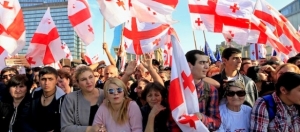NDI Polls: Georgians View Russia as Biggest Threat to their Country
Recent poll results released by the National Democratic Institute (NDI) and CRRC Georgia revealed that 63 percent of respondents from the Republic of Georgia believe that Russia represents the biggest threat to the country, while a significant majority (78 percent) view Russia as a threat to neighboring countries, and almost half of Georgians believe that Russia has had a negative impact on Georgia’s economy (41 percent), security (41 percent), and politics (42 percent).
The NDI poll results reflect data collected from April 7 to April 28 through face-to-face interviews with a nationwide representative sample of Georgia’s adult population, excluding the Russian occupied territories of Georgia – Abkhazia and Tskhinvali (South Ossetia) that included 2,493 completed interviews.
Furthermore, 47 percent of those interviewed say that Russian propaganda exists in Georgia, propaganda which is distributed primarily through Georgian television, political parties and social media.
Despite these views, Georgians are divided on whether the dissolution of the Soviet Union was a good or bad development for the country (48 percent and 42 percent respectively).
The results also show that older members of the population, people living in minority settlements, people with lower education levels, and those that see fewer benefits in visa liberalization are more likely to lament the end of the Soviet Union. Non-English speakers and those who do not believe that Russian propaganda exists in Georgia are also more likely to believe that the dissolution of the Soviet Union was a bad thing.
To the question: “What is the top threat to Georgia’s national security?” The majority of Georgians named Russian military aggression (34 percent), the occupation of Abkhazia and South Ossetia (16 percent), Russian propaganda (5 percent), economic dependency on Russia (2 percent), and energy dependency on Russia (2 percent). All Russian factors combined make up 60 percent.
Half of Georgians (52 percent) agree that Georgia is a secure country, while half disagree.
The survey shows that Georgians’ support for the European Union (EU) has risen to 80 percent from 72 percent since the November 2016 survey. As in previous polls, this support is lower among older people (70 percent compared to 84 percent of youth) and those in minority settlements (54 percent). Reasons for supporting Georgia’s membership are largely related to economic and employment concerns, although supporters also believe membership would strengthen security and democracy. For those who do not support EU membership, 43 percent believe it would cause conflict with Russia, while 24 percent believe that EU membership would weaken the country’s cultural identity.
The majority of Georgians (92 percent) is aware of the recent visa liberalization to most EU countries, although this percentage is significantly lower in minority settlements, at 64 percent. A large majority (78 percent), however, agrees that even with visa liberalization, “ordinary people” will not be able to travel to the EU. Most Georgians, 64 percent, say they have enough information on the rules and procedures surrounding visa liberalization. Despite this, 67 percent state that many Georgians will emigrate.
The NDI found that NATO support is strong, with 68 percent of Georgians approving membership. As with the EU, this approval is lower among older and in minority settlements. Those who support NATO membership believe it will provide greater security (71 percent), while 30 percent believe membership will benefit the economy. The vast majority of Georgians who disapprove of NATO membership feel that membership would bring a high risk of Russian aggression toward Georgia. Misinformation about NATO is evident. A quarter of Georgians (23 percent), for example, thinks that the country is already a NATO member.
“Georgians continue to demonstrate resilient support for the country’s EU and Euro-Atlantic goals, but the impact of disinformation campaigns is clear through the views and misinformation prevalent among segments of the population, particularly the narratives that the EU and NATO will lead to Russian aggression and weaken the country’s culture and identity,” says NDI senior director Laura Thornton.
However, she added that leaders and stakeholders devote more energy and information towards vulnerable segments of society – older, rural, and minority populations, and continue to build “strong, preemptive messaging to counter misinformation.”
Thea Morison











